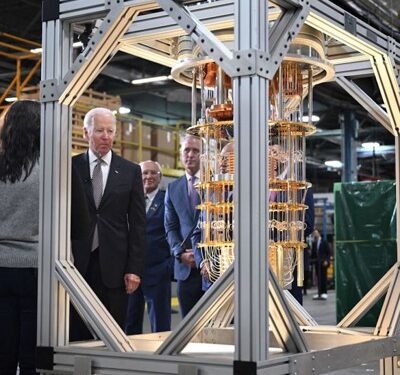The real breakthrough in quantum computing is always ten years away, or so goes the old saw. But even though disagreement persists about how to measure the performance of one quantum computer over another, and even how to code for machines that are fundamentally unlike the machines that code was invented for, the U.S. Navy is already experimenting with sort of highly complex problems that only quantum computers can solve.
One of them is scheduling satellites to be in specific places at specific times to collect images.
“We have a project where we are taking information that we are getting that relates to how we schedule the satellites and what targets they should focus on. It turns out that that is what’s known as an NP-hard problem,” Lennart Gunlycke, technical director of the Navy’s Quantum Program, said last week at the AFCEA West conference in San Diego, California. “And we’ve already made some good progress.”
Quantum computers are distinct from traditional computers in that they run on qubits as opposed to bits. The latter, based in logic gates on a silicon transistor, can have a value of 1 or 0. Qubits, or quantum bits of information based on the behavior of subatomic particles, can have values anywhere between 1 and 0, allowing them to solve problems beyond the practical reach of traditional computers.
IBM, which in December unveiled a processor that can handle more than a thousand qubits, has also a quantum computer roadmap stretching into the next decade.
“We fully intend to field a 100,000-qubit machine by the year 2033. In fact, we will field three of them. We have already partnered with the University of Chicago and the University of Tokyo for two of those machines,” Joseph S. Broz, IBM’s vice president for quantum growth and market development said in San Diego. “A 100-qubit machine has a computational space and dimension that is larger than all the atoms in the known universe. So you can imagine the computational power behind a 100,000-cubed machine.”
Faster airplane design is among the commercial applications of quantum computing that could carry over into defense, Broz said.
“You mentioned optimization, logistics, and contested logistics. Also in the materials and chemistry areas, many of the companies that we work with, such as Boeing, we are utilizing quantum computing to optimize flight composites for aircraft and on airfoils. That turns out to be a very difficult problem. When you look at optimizing those materials against the various constraints of yield modulus, weight, curvature, and various tensile strengths in three dimensions, turns out to be a very difficult problem, if successfully applied, quantum computing could optimize the development of those materials.”
Gunlycke said the Navy has been doing chemical simulations on quantum computers to better understand corrosion on ships.
Operators might be able to use quantum computers not just to task satellites but jets, drones, and other weapons., The algorithms would resemble those of a delivery company that wants to send pickup orders to the most suitable drivers, based on distance to pickup and drop off, said Michael McMillan, the executive director of the Naval Information Warfare Center (NIWC) Pacific.
“You would assign that to the person who’s about to drive by the 7-11, who could just pull in and pick up that Slurpee and deliver it to someone and then the lunch to the place it was destined to go to. If you think about that in very simple terms and expand that into an area like the Pacific, whether you’re dealing with a surveillance problem, or whether you’re dealing with what are the right weapons to apply to specific targets, optimize the effects given the limited weapons we have to avoid you know, there are ways to bring this down really specific naval and DOD problems,” McMillan said. “Is quantum going to replace the systems we have right now on chips? I don’t think we’re at that point. I think we’re probably a decade away from anything like that.”
Private investment in quantum computing for such dual-use applications is booming. But Broz said the U.S. government is underfunding quantum computing compared to China, and it’s not even close.
“The United States is third or fourth in terms of the funding race,” he said. “We share that bottom quartile with nine other nations, most of them are allies. So we’re not only underfunding quantum but we’re underfunding it across a huge footprint of the globe with public funding.”









